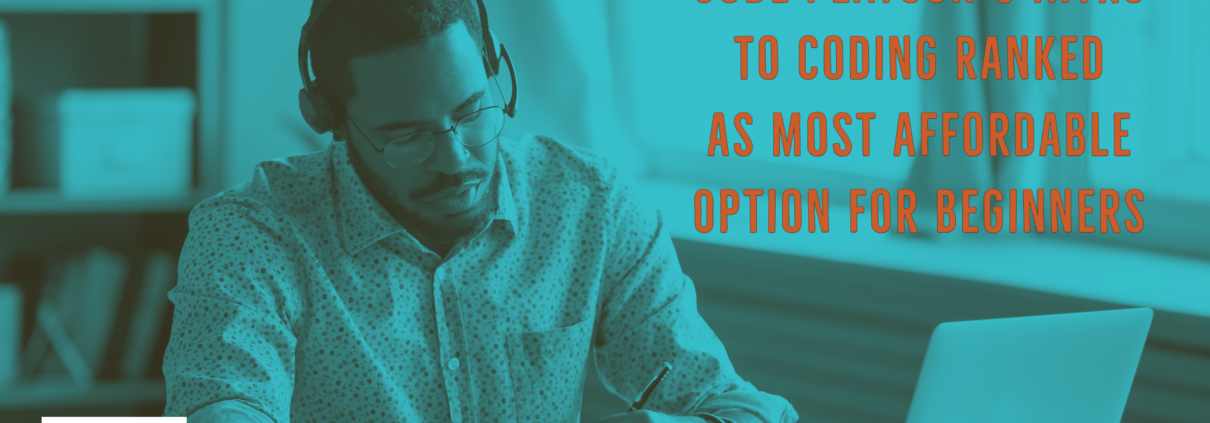The longest war in American History ended this year. Take that in for a second. Think about how the weight of that fact alone should make Veterans’ Day hit a little bit differently this year for all Americans, but even more so for those like myself who served our country during wartime.
Watching the turmoil unfold this year in a freshly independent and abandoned Afghanistan echoes what I saw and felt at the end of my own time in the Iraq war. It’s times like these where it’s hard to ignore similar thoughts to what I’ve had in the past. Thoughts like “did the 15 months I spent working there mean anything if this is how these conflicts seem to end every time.” Or other questions like “is it worth the trillions of dollars and thousands of lives spent on these efforts if we’re not leaving it unarguably better than we found it.”
Obviously, the consequences of these wars affect Veterans quite deeply. Being called to serve in times of conflict is what we spend most of our time in the military training or preparing for, where the stakes will never be higher. Every decision carries so much weight when a person’s daily workplace is a literal war zone, and the nature of the work is truly a matter of life or death.
For many Veterans, answering the call to serve in these wars will carry the strongest ‘sense of meaning from work’ we’ll feel in the span of our career or life. It matters when your country needs you and calls you to serve a higher purpose. Military service isn’t all life and death. However, most military jobs still involve responsibility for millions of dollars worth of equipment or organizing a group towards completing some larger, more important goal.
This is why I’m happy to see companies commit to and hire Veterans, helping to ‘remobilize’ America’s best, enabling a new sense of purpose in many Veterans that they may not have felt since they served. I don’t believe opportunities like that can carry a price tag.
For me, what started as just a way to pay for college, joining the Army National Guard at 17 years old, ended up being the motivation, self-discipline, and accountability I knew I was missing in my life. It took me places professionally and around the world that I likely never would have been able to get to on my own.
Although all National Guardsmen and women signed up with an agreement to be deployed overseas if necessary, after 9-11, the U.S. government changed the way they started applying the use of Reservists, or part-time Army units (usually serving one weekend per month and two weeks every Summer). Suddenly, the mission wasn’t just limited to filling sandbags to fight floods at home; but instead, we were being sent to fight an unclear enemy, miles from home, and at times, without the exact training and equipment necessary. These jobs don’t have an instruction manual, so we had to figure out a lot on the fly while trying not to get shot. We were fired on often, with mortar shells, small arms fire, a lot of rocket-propelled grenades, and it was difficult for me to see the casualties on both sides.
The hardest days of my life were during my military service, but it was also the most formative. No regrets. However, after I was deployed overseas once, for 15 months straight active duty, and having multiple brushes with death, I was pretty intent on never being in a position to get sent back for a ‘round two’. So, when my duty time was up, I was more than ready to start the next chapter of my life.
For Veterans first starting out, by comparison to military service, there is an overwhelming lack of structure in the civilian world that we have to orient ourselves to. In many ways, moving to ‘civilian work’ as a newly-minted war Veteran felt somehow as foreign as first landing in Iraq had felt. After a trial-and-error chain of jobs, it would be a difficult road before I would find similar meaning from work again.
I often see my Veteran experience bubbling to the surface, informing so much of what I do, especially in three main areas: dealing with stressful situations, meeting the demands of new training requirements, and leading initiatives or people. Though we don’t always share details of our Veteran identity at work, it’s through our work that we’re sharing the value on which that identity is built. Leadership is the piece there that I think is the most significant.
It goes without saying that strong leadership is paramount for an organization to grow and thrive, critically necessary to its success. True leaders have a sense that they are working for the people they lead and demonstrate that daily. One of the main things I took for granted while in uniform was that authentic leadership, by design, was woven so deeply inside the military culture. By comparison, within the civilian workforce, it’s a difficult thing to find remarkable examples of.
The American military is basically a leadership incubator, where the processes that fuel it have been tested and improved for almost 250 years. Who else has been in business that long? After they experience the world’s gold standard for leaders, Veterans’ standards and expectations for professional development and quality leadership become very hard to meet. Imagine how intensely micromanaged could feel to a Veteran, especially after the level of responsibility most have been trusted with during their time in service. As Veterans integrate with your business or team, it’s essential to understand that previously, they have built this intense literacy for leadership. They will now seek it out. Most bring their innate sense of leadership to their work, well beyond their time in uniform.
As a thought exercise, consider the potential if your company tore a page out of the military’s playbook and how teams could benefit from ‘meeting Veterans where they’re coming from’ when it comes to leadership. For example, and I know some trades do this, but what if corporate leaders all developed their subordinates to be able to fill in at a moment’s notice for their superiors’ duties, as is standard in the military? Imagine the level of trust, continuity, retention, and readiness teams could have as a result. Instead of things slowing down or pausing for a while when someone moves on, imagine how we could innovate, the momentum we’d have, and the results we could produce by applying the approach to leadership that Veterans bring. When a Veteran leaves the military and joins the workforce, don’t undervalue that ‘leadership awareness’ mindset that comes with them.
Another defining constant of the military or Veteran experience that we bring to the workplace is a focus on the importance of training. From the day we join the military to the day we leave, we constantly prepare to be the best for when it matters the most. Classes, exercises, simulations, checklists, assessment tests, review boards, measuring and improving to meet or exceed the standards. Without that, we risk just waiting to fail, and with life and liberty on the line, hope is not a method, and failure is not an option.
The Army had such an amazing structure behind its training model, and I leverage it when imparting any new skill to someone on the job. Since boot camp, the simple recipe of ‘Tasks, Conditions, and Standards’ has been drilled into at least Army Veterans. It’s a framework that enforces accountability, which can be hard to do, the larger an organization gets. However, this 3 part structure was applied to and worked for, everything from learning to fire a rifle to dressing battlefield wounds.
To break this down, ‘tasks’ are the individual actions you demonstrate, as the learner, to show you have ‘learned the thing.’ Meanwhile, the ‘conditions’ are simply the environmental factors or rules at play when completing the tasks, and best of all, ‘standards’ define what success means or are the extent to which tasks should be completed. Maybe it’s overkill for some of the more simple civilian training needs we have, but it’s worth explaining because many Veterans’ military service is spent 95% on training, and not a week goes by where I don’t need to learn from or train up someone on something new. It’s a simple guard rail that can add value to something we do every day.
One last major area where I believe Veterans’ experiences add more value in the civilian workforce is overcoming adversity and staying resilient to change. In part, it comes from situations where significant responsibility was a factor or from being tested with intense situations. Basically, in situations where there’s a lot on the line, and one is pushed to perform under pressure, there’s a lot of growth to come out of that and can be applied to deadlines, operational responses, or in areas of a business where there’s little to no room for failure.
For example, living and working for a year inside a war zone, with no ‘front line’ and an enemy that can come out of nowhere at any time, there’s a certain sense of resilience or perseverance you develop. For me, part of that is accepting the conditions of a situation where you don’t have control, which helps enable you to still function, maintain your sanity, and deliver results.
Even as I write this now, I had to stop and consider how weird the words “enemy fire” would sound to my corporate colleagues, and to what extent would I have to explain that? Would they be able to put together that means being shot at or bombed while you’re ‘working,’ just from the context alone? In Iraq, not a week would go by without someone trying to, or- almost killing us. That constant threat really just illustrates the distance between the battlefield and the post-military career field. Simply put, all that could possibly go wrong in a military workday really prepares Veterans to not ‘sweat the small stuff’ afterwards in our civilian careers.
Overall, I think every work culture both desires and benefits from having model citizens as members, and I can’t think of any other experience where I’ve been among the best of the best when it comes to the values I’ve laid out here, which are instilled by a Veterans’ military service. I’d say without hesitation that Veterans make the workplace a better place, and just like their service sometimes, the contribution goes unnoticed, and we’re fine with that. Veteran culture is a humble one because we were truly ‘just doing our jobs’ in uniform.
So, thanks for your respect for Servicemembers and their service, and to companies and managers, the value should be obvious of hiring Veterans whenever possible. Seek to understand and leverage your current Veteran-colleagues’ strengths to enhance your teams and organizations. And please remember that whatever capacity Veterans serve in after they’ve served, their sense of duty and commitment will always add value on levels that a paycheck alone simply can’t inspire.
Justin Savage is an Army National Guard Veteran and a 2020 graduate of Code Platoon’s Kilo Platoon. Justin is a Full-stack Software Engineer at JP Morgan Chase.
The post SERVING AGAIN: VETERANS IN THE WORKPLACE originally appeared on Veterans Day, November 11, 2021, on LinkedIn. Code Platoon thanks Justin Savage for permission to repost this blog.



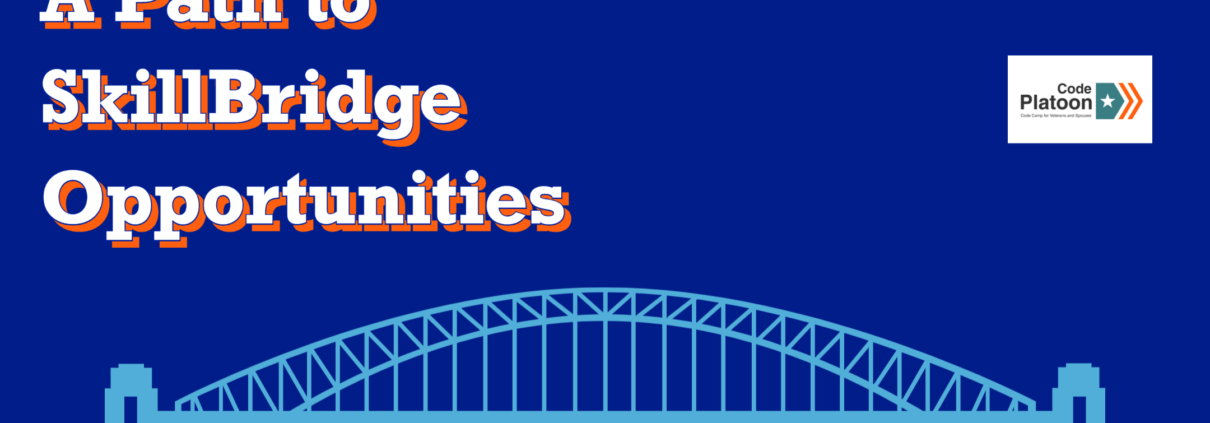
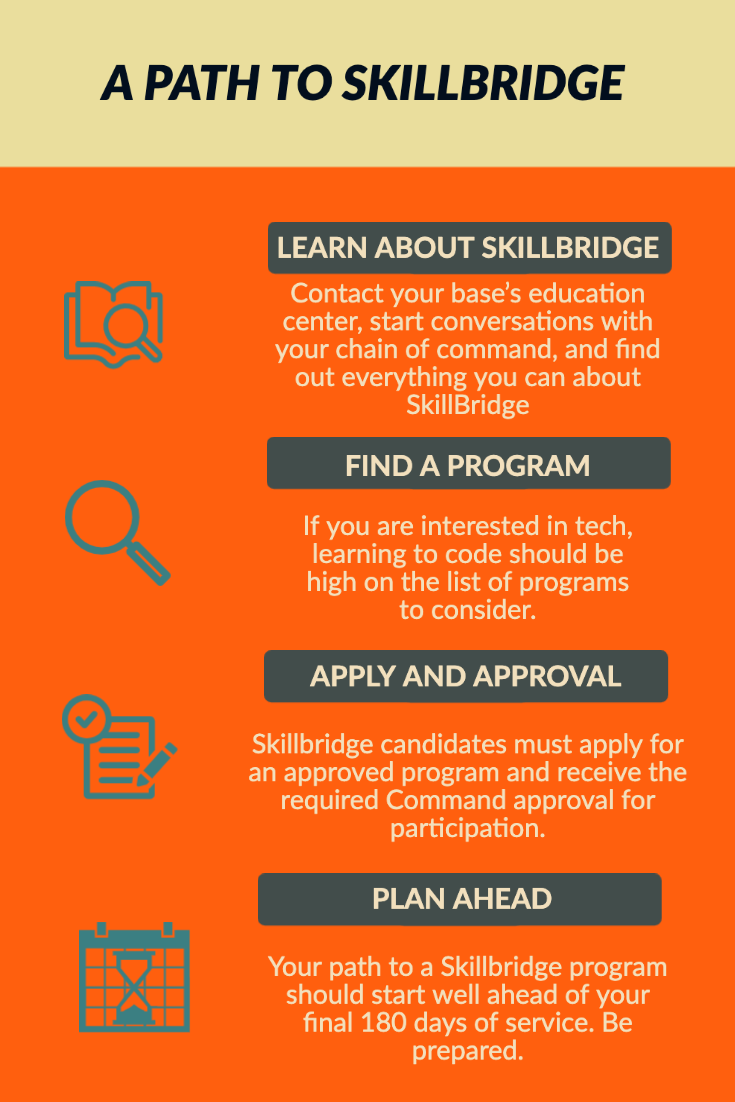
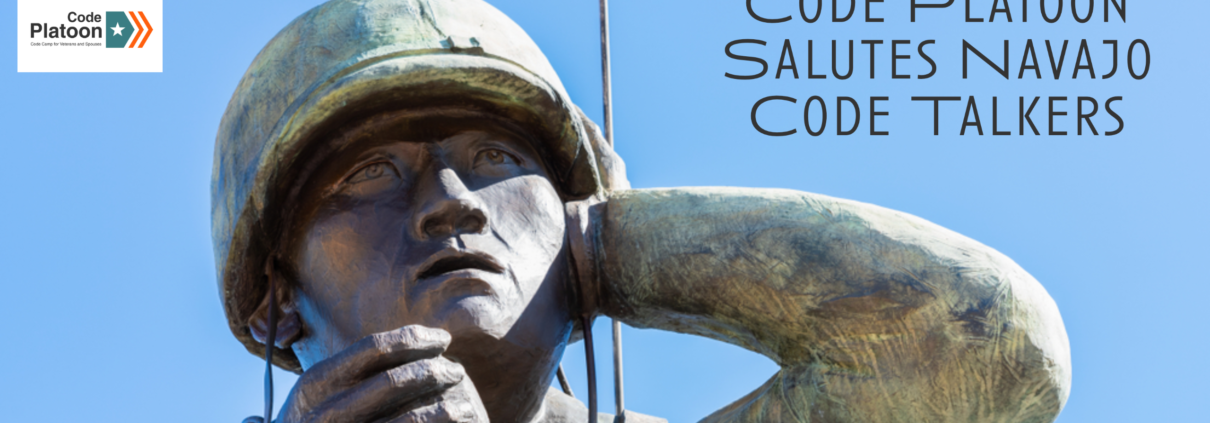
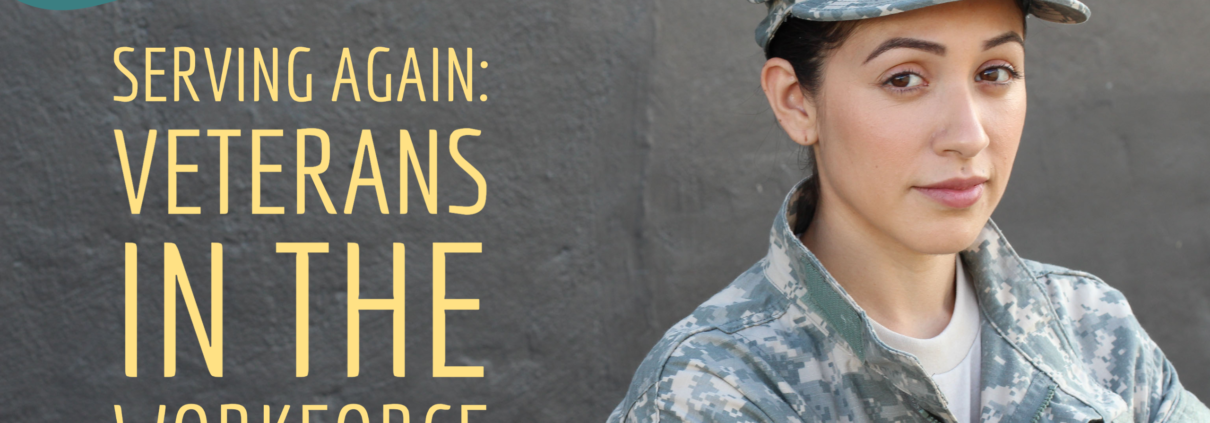


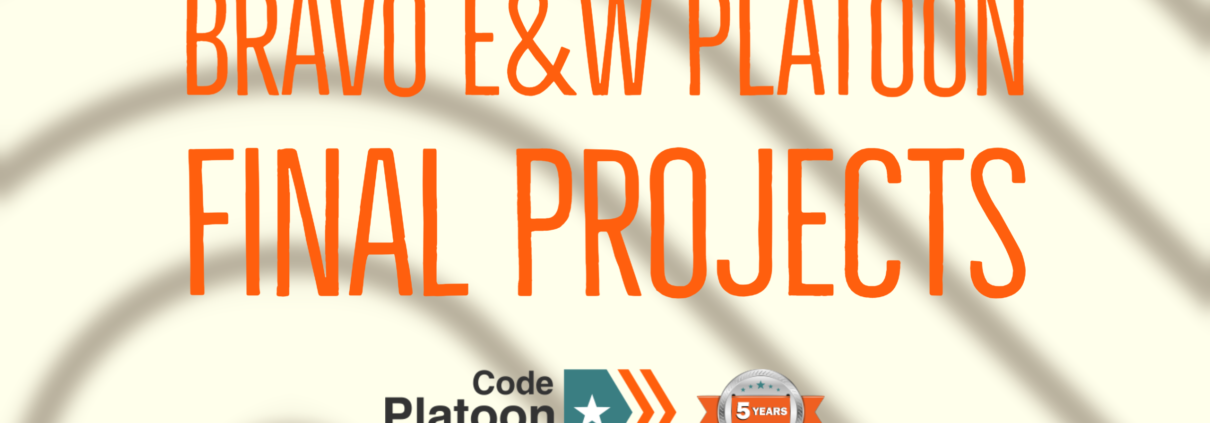

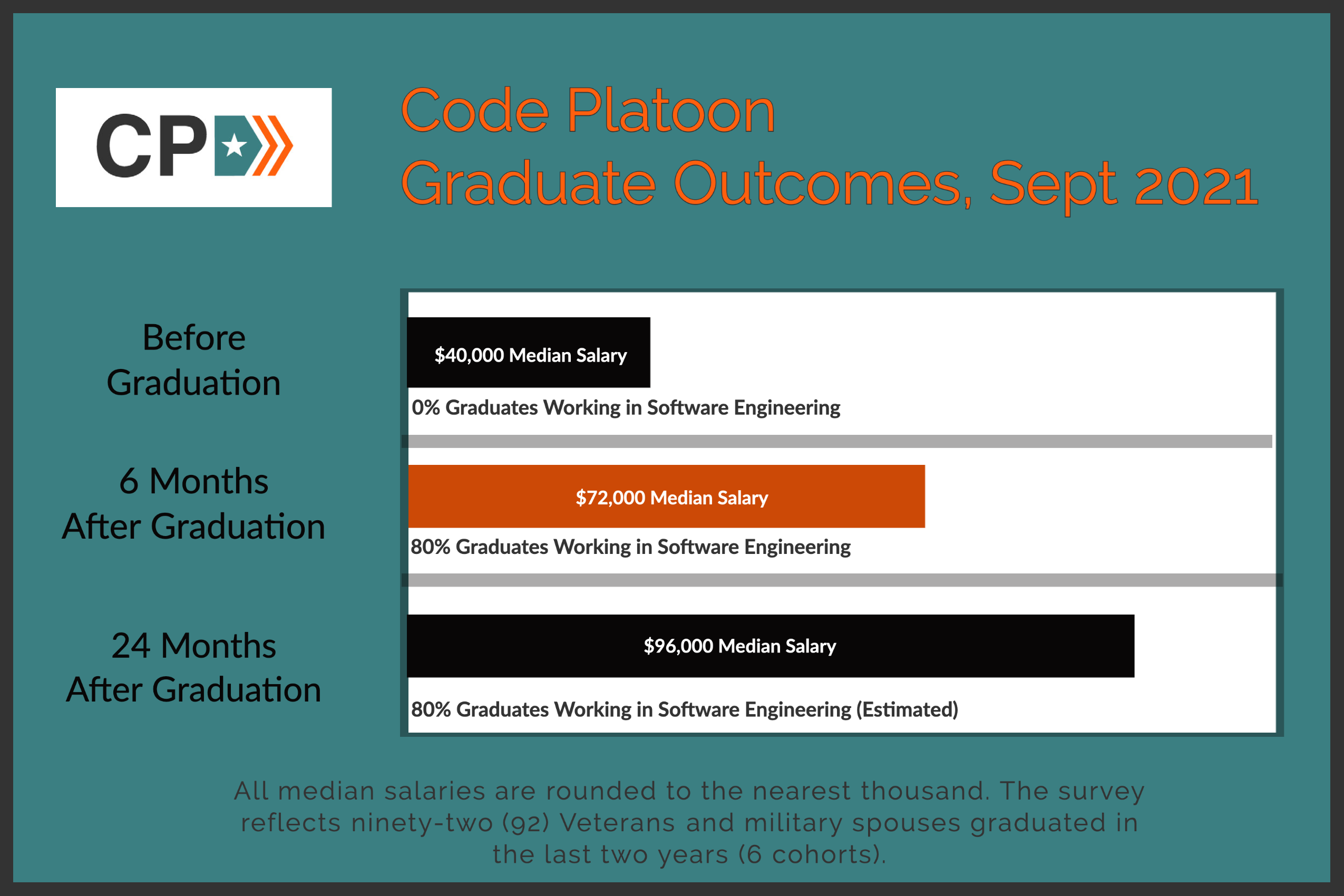 We attribute the excellent success rates of our graduates to several factors. First of all, our students come hungry to learn and are working long hours every day. Second of all, we have some great tech community partners who help our students with job placement. And, of course, there is the program itself.
We attribute the excellent success rates of our graduates to several factors. First of all, our students come hungry to learn and are working long hours every day. Second of all, we have some great tech community partners who help our students with job placement. And, of course, there is the program itself.